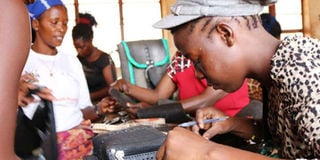Recycling, creativity are Njola’s wealth

Allen Njola Nabukenya makes a bag out of old tyres. Below: Bags for sale. COURTESY PHOTO
What you need to know:
- Allen Njola Nabukenya, the founder of Njola Impressions makes pieces from polythene bags and tyres that have attracted prominent clients. She tells Christine Kasemiire about how she’s cashing in on recycled stuff.
Allen Njola Nabukenya, clad in one of her pieces, made a grand entrance into the MTN offices at Nyonyi gardens a few weeks ago. Her shoes were so unique that you could hardly miss them. The confidence she exuded would make you forget about the ever-increasing unemployment levels in the economy.
So strong an impression she left on the telecom, she was given a standing ovation to appreciate her innovation.
Nabukenya makes things out of disposed polythene commonly known as ‘kaveera’ and tyres.
Nabukenya’s recycling business, Njola Impressions, based in Wandegeya, was derived from the back of a classroom at Kyambogo University in 2015.
The 26-year-old who pursued a Bachelor’s degree in Art and Design and specialising in community-based needs course, was tasked to design an art project addressing a social economic problem.
“I am the founder of Njola Impressions and Njola Recycling Initiative. Through this initiative, we train other youth in different communities. When I was at University, I used to work with street children to collect trash, prior to being ferried away by Kampala Capital City Authority (KCCA) to dumping sites,” she narrates.
Coming second to last in a family of 21 children, Nabukenya defies the odds to beat a statistic that predetermines her fate as doomed, stemming from a world of atrocities from the slums. A revelation like no other, she thought she could help people, get an A at a school assignment while making money. Nabukenya’s determination was inspired by her loathe for being employed.
“People were looking for me offering to pay me a lot of money. But I refused. As an artiste, I am working for myself. So I left other job opportunities,” she mentions.
Capital was no problem for the university student who only picked tyres and polythene bags (kaveera 0to make shoes, which were her debut product. Due to overwhelming demand, she embarked on research to grow her business which now makes bags, key holders and clothes among others from polythene and tyres thrown away, just to be bought back as beautiful products.
“This started with me. I didn’t start with any money because this is waste, kaveera is just dumped. I sold my first shoe made out of kaveera, at Shs50,000 and people liked it. Because of the demand, you research. Since people would want bags and clothes matching their attire, I decided to grow my product line,” she says.
Stitch for stitch, every inch she picked, Nabukenya continued meeting different people, some of whom her life goals were attached.
Her products have stood out, attracting prominent buyers including Kyaddondo East Member of Parliament (M.P) Robert Kyagulanyi Ssentamu, aka Bobi Wine.
She has since received orders from other parliamentarians itching to own one. The number only accelerates with more market from foreigners and locals communities.
“People like creativity and we make unisex products. After the laptop bag I made for Mr Kyagulanyi, Mukono Municipality M.P Betty Nambooze then requested for the same bag,” she says.
A small girl with a big brain, Nabukenya acknowledges challenges in the business but steers hard to discredit their impact.
“We have a challenge of the machines. We cannot do mass production but we overcome them by synergies with other companies, to accomplish our work. These are sometimes transport companies for the dirty wastes and friends occasionally pitch in,” she says.
As any other business in Uganda, Nabukenya says the budget is dismal to efficiently take care of training youth and purchasing the necessary equipment to grow the business further.
Future
However, she envisages, her business to grow into an assembling company in the near future. Here, it will also engage more youth while clearing streets of waste and boosting their incomes.
“We would like to see Njola in different slum areas, doing division of work. Kitezi does the washing, Kamokya youth can do punching, while Bwaise does assembling and selling takes place in one place. I believe we shall do mass production then,” the optimistic Nabukenya says.
Addressing social problem
Njola Recycling Initiative, no sooner picked the interest of KCCA which then offered Shs10m for the recycling campaign, an amount she had only written about in school. The funding aimed at boosting the environment preservation initiative, whilst ensuring children from slums acquire skills.
“Wastes in the slums are the cause of many hygienic disorders. So we have a campaign, the Ghetto Wardrobe Movement where we train youth from different slums how to use industrial wastes to make finished products,” she says.
WHO IS SHE?
Allen Njola is a student of Bachelor’s degree in Art and Design and specialising in community-based needs course.




